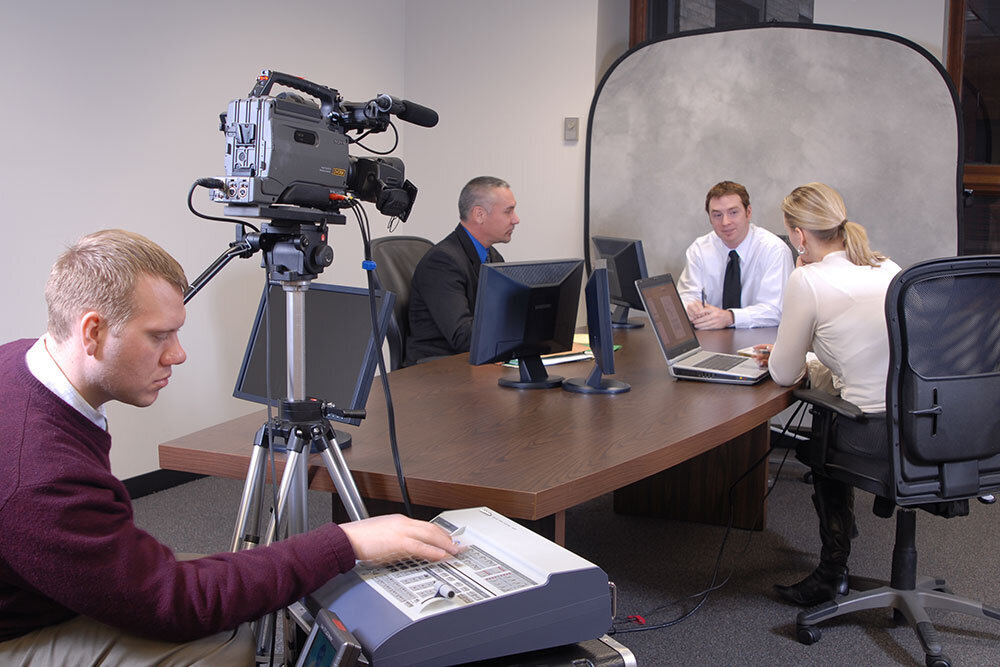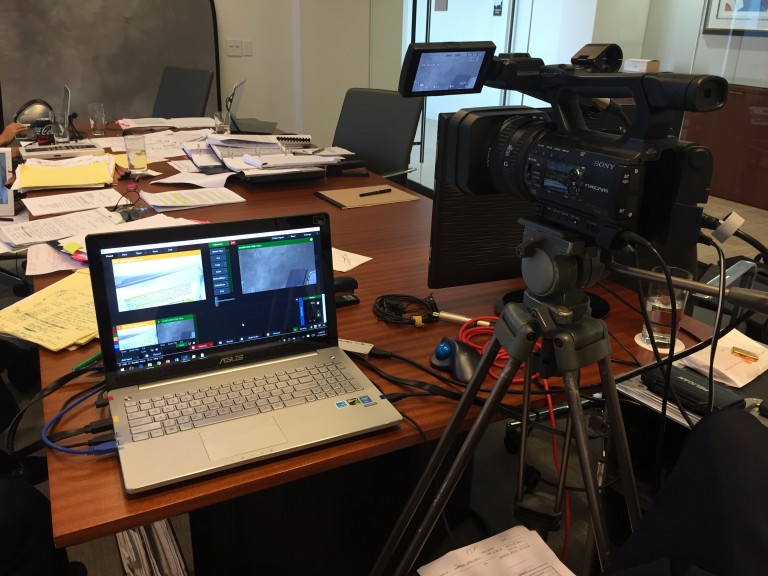The Importance of Legal Video Clip Depositions in Modern Legal Solutions: What You Ought to Know
Lawful video clip depositions have ended up being vital in today's lawful landscape. They supply a multidimensional sight of witness statements that traditional transcripts merely can not match. By capturing both spoken and non-verbal interaction, these depositions boost the general understanding of a witness's reliability. The performance of video depositions hinges on numerous variables, consisting of conformity with lawful standards and finest techniques. Checking out these aspects discloses their real significance in modern-day legal solutions
What Are Lawful Video Clip Depositions?
Lawful video clip depositions work as an important tool in the lawsuits process. They involve recording witness testaments in a video layout, catching both spoken and non-verbal interaction. This technique permits attorneys to document the behavior, expressions, and responses of witnesses, offering a richer context for the testimony. Commonly performed in a controlled setting, these depositions are led by lawyers who ask concerns while a stenotype reporter documents the dialogue. The resulting video can be essential for trial preparation, as it makes it possible for attorneys to examine the reputation of witnesses and improve their techniques. Furthermore, legal video depositions can be utilized in different legal contexts, varying from civil disputes to criminal instances. The auditory and visual components of video clip depositions boost the discussion of evidence, making it an essential part in the modern lawful landscape. Generally, they add significantly to the efficiency and efficiency of lawful process.

Advantages of Video Clip Depositions Over Typical Techniques
Video clip depositions use many advantages compared to standard techniques of taking witness statements. One substantial benefit is the capability to record both audio and aesthetic aspects, offering an extra complete document of the witness's declarations. This twin format improves clearness and enables lawful experts to reference details subtleties throughout test preparation. Furthermore, video depositions assist in remote engagement, making it simpler for witnesses who might be inaccessible for in-person looks as a result of geographical restraints or health and wellness issues.Moreover, video depositions can quicken the total deposition process, lowering the moment and costs related to traveling and logistics. They also enhance accessibility, as tape-recorded depositions can be quickly shared among lawful teams and referenced at any moment. This benefit adds to better case administration and prep work. On the whole, video clip depositions represent a modern-day, reliable approach to collecting witness testimonies, aligning with the advancing requirements of the lawful career.
The Function of Body Movement and Tone in Testimonies

In legal video depositions, body language and tone play vital duties in communicating a witness's trustworthiness and dependability. Nonverbal signs can provide insights into a witness's mood, influencing how their testimony is perceived. Understanding the influence of these components is crucial for attorneys and jurors alike when examining the reliability of a statement.
Nonverbal Communication Insights
While spoken communication is frequently emphasized in legal testaments, nonverbal signs such as body movement and tone play a necessary role in conveying trustworthiness and feeling. Onlookers of depositions may keep in mind that a witness's pose, motions, and facial expressions can substantially affect understandings of integrity. Constant eye call may signify confidence, while avoiding gaze could recommend deceit or pain. In a similar way, the intonation-- its pitch, volume, and speed-- can impart feelings of sincerity or unpredictability. Lawyers have to be attuned to these nonverbal signals, as they usually supply important context that matches talked words. Recognizing these nuances can enhance the efficiency of depositions and affect the result of lawful procedures.
Emotional Tone Effect
The psychological tone communicated throughout legal testaments considerably influences exactly how a witness is viewed. Body movement, vocal inflections, and faces play important roles in shaping the story of a testament. A witness exhibiting self-confidence through steady eye contact and a calm tone can infuse a feeling of reliability and involvement. Conversely, indications of anxiousness, such as fidgeting or an unsteady voice, might lead to uncertainty regarding their account. The nuances of emotional expression can influence the analysis of realities, making it essential for lawyers to identify these hints. In video clip depositions, the aesthetic and acoustic elements integrate, stressing the value of psychological tone in sharing sincerity and reliability within the lawful process.
Reliability and Dependability
An essential variable in establishing trustworthiness and trustworthiness during statements lies in the witness's body movement and tone of voice. Observers usually rely on non-verbal signs-- such as eye contact, position, and gestures-- to analyze a witness's sincerity. A witness who preserves eye contact and shows open body language may be regarded as even more honest and reliable than one who stays clear of eye get in touch with or shows up shut off. Furthermore, tone of voice plays an essential role; a consistent, tranquil tone can reinforce the reliability of the testament, while fluctuations in pitch or quantity might raise questions. Eventually, the combination of body language and singing tone greatly affects exactly how a witness's statements are gotten and interpreted in a lawful context.
Finest Practices for Conducting Video Depositions
Performing video clip depositions calls for mindful planning and execution to ensure a clear and effective presentation of testimony. Initially, it is very important to pick a quiet, well-lit place to lessen disturbances and safe optimal video clip quality. The equipment must be tested in advancement, including cameras, microphones, and illumination, to stay clear of technical concerns during the deposition.Next, events included need to evaluate the style and treatments ahead of time, ensuring that everyone recognizes their functions. The deponent should be informed on the procedure, consisting of exactly how to react clearly and concisely.Additionally, keeping an expert demeanor throughout the session is vital. This consists of refraining from speaking over each other and validating that all questions are directed appropriately. It is important to tape the deposition in a style that permits for very easy playback and testimonial, preserving the stability of the statement for future use.
Legal Considerations and Conformity Issues
How do legal considerations and conformity problems influence the effectiveness of video clip depositions? Lawyers must browse a complex landscape of guidelines, guaranteeing that video depositions stick to administrative regulations and criteria. Conformity with regulations worrying privacy, consent, and recording approaches is vital. Obtaining explicit authorization from all parties entailed is needed to stay clear of legal repercussions.Additionally, the admissibility of video proof in court can pivot on conformity with procedural requirements. Making sure that the devices used satisfies technical requirements is also important, as inadequate quality can undermine the deposition's reliability.Moreover, attorneys should know any kind of details state laws that govern video clip depositions, as these can differ significantly. Failure to address these considerations can not only threaten the stability of the deposition yet additionally impact the general instance method, eventually influencing the customer's legal outcomes.
How Video Depositions Effect Court Assumption
While video clip depositions can serve as powerful tools in legal procedures, their impact on court understanding is substantial. The aesthetic and auditory aspects of video recordings provide jurors with a more comprehensive understanding of witness temperament, integrity, and emotional feedbacks. This multimedia technique can boost the jurors' ability to examine the reliability of testament compared to traditional text-based transcripts.Moreover, video clip depositions permit jurors to observe body movement, intonation, and faces, all of which can impact their analysis of the witness's statements. The visibility of a witness on screen can humanize them, promoting compassion and link, which might sway jurors' viewpoints. Conversely, a witness that appears evasive or unreliable on video may result in adverse perceptions that influence a court's decision. Eventually, the dynamic nature of video clip depositions plays an important function fit just how jurors translate proof and reach their judgments.
The Future of Video Clip Depositions in Legal Practice
As innovations in modern technology proceed to improve the lawful landscape, the future of video clip depositions is poised for considerable development. Advancements such as expert system, online truth, and boosted video clip conferencing devices are expected to improve the deposition process and boost accessibility. Attorneys might utilize have a peek at these guys AI-driven analytics to evaluate witness reliability and instance toughness extra effectively.Moreover, the integration of virtual fact might permit courts to experience immersive simulations of depositions, supplying much deeper context and understanding. In addition, the trend toward remote depositions is likely to linger, supplying higher versatility for customers and attorneys alike.As remote job ends up being significantly stabilized, video clip depositions will likely come to be conventional practice, reducing costs and time constraints associated with traditional methods. On the whole, these technical improvements guarantee to improve the effectiveness, effectiveness, and access of video depositions in lawful method, eventually transforming just how lawyers get ready for trial.
Frequently Asked Concerns
How Much Do Legal Video Clip Depositions Generally Price?

Can Video Depositions Be Made Use Of in Any Kind Of Kind Of Instance?
Video depositions can be made use of in numerous kinds of instances, consisting of civil, criminal, and family members regulation. Their flexibility permits lawyers to present witness statements successfully, adapting to the particular needs of various lawful circumstances.
What Devices Is Required for a Video Deposition?
To conduct a video clip deposition, essential tools includes a high-grade camera, microphone, lights, and a trusted recording device. Additionally, a computer system with modifying software may be essential for post-production and formatting the final video.
For how long Does a Regular Video Deposition Last?
A normal video clip deposition lasts in between two to four hours, depending on the intricacy of the instance and the variety of inquiries presented. Extended sessions might occur, yet breaks are typically included for participant convenience.

Are Video Clip Depositions Admissible in Court?
Video clip depositions are generally permissible in court, offered they adhere to legal requirements and regulations of proof. Their usage boosts clarity and maintains witness statement, helping in the judicial procedure during hearings and tests. Lawful video clip depositions have actually become essential in today's legal landscape. Additionally, legal video clip depositions can be used in various lawful contexts, ranging from civil disputes to criminal situations. read In addition, video depositions help with remote engagement, making it much easier for witnesses who may be inaccessible for in-person appearances due to geographical constraints or wellness issues.Moreover, video clip depositions can quicken the general deposition procedure, lowering the time and costs connected with travel and logistics. Ensuring that the tools used fulfills technical requirements is also important, as bad top quality can my review here weaken the deposition's reliability.Moreover, lawyers should be conscious of any kind of specific state regulations that govern video clip depositions, as these can differ substantially. In addition, the fad towards remote depositions is most likely to persist, providing higher flexibility for clients and attorneys alike.As remote job ends up being progressively normalized, video clip depositions will likely become basic technique, lowering prices and time restraints associated with standard approaches.